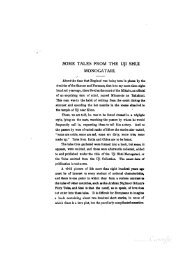Chau Ju-Kua - University of Oregon Libraries
Chau Ju-Kua - University of Oregon Libraries
Chau Ju-Kua - University of Oregon Libraries
You also want an ePaper? Increase the reach of your titles
YUMPU automatically turns print PDFs into web optimized ePapers that Google loves.
ISTRODUCTION. 37<br />
the information supplied him directly by Chinese and foreign traders <strong>of</strong> the<br />
lands they had visited and concerning the products <strong>of</strong> their soil. The facts he<br />
there records are not to be found in any other known Chinese work either <strong>of</strong><br />
the thirteenth or <strong>of</strong> subsequent centuries; he was the first, so far as we know,<br />
5 to make known to China the names and some few facts, at least, concerning<br />
many countries and localities <strong>of</strong> south-western Asia, <strong>of</strong>Africa and <strong>of</strong> the Medi-<br />
terranean Sea.<br />
The sections <strong>of</strong> the Chu-fan-chi based exclusively, it would seem, on oral<br />
information famished the author by Chinese and foreign traders, are those<br />
10 dealing with San-fo-tsM, Tah-ma-ling, Ling-ya-ssi-kia, Fo-lo-an, Sin-t'o,<br />
Kien-pi, Lan-wu-li, Si-lan, Su-ki-tan, Nan-p'i, Hu-ch'a-la, Ma-lo-hua, Tsong-<br />
pa, Wu-pa, Chung-li, Wong-man, Ki-shi", Pi-sSi-lo, Wu-ssi-li (Egypt),<br />
0-k6n-to, An-tO'man, Cha-pi-sha, Ssi-kia-li-y6, Mo-ki6-la, Po-ssi, Ma-i,<br />
San-sti and Pi-sho-ye.<br />
15 In some chapters, while most <strong>of</strong> his information must have been supplied<br />
him by traders, he has added to it paragraphs taken from Chou K'u fei's<br />
work. These are the chapters on Chan-ch'6ng, Pin-tung-lung, Chon-la, P'u-<br />
kan, Sh8-p*o, Chu-li6n, the Ta-shi, Pi-pa-lo and Ki-tzi-ni.<br />
In the chapters on Ta-ts'in, T'i6n-chu, Wu-ssi-li (Mosul), Lu-mei, Mu-<br />
20 lan-p'i, Ma-kia, Pai-ta, K'un-lung-ts6ng-ki, Sha-hua-kung, Ma-lo-nu and<br />
Nii-kuo, he either quotes nearly verbatim the Ling-wai-tai-ta, or takes prac-<br />
tically all his information from the Dynastic histories, the T'ung-tien or some<br />
other minor work, adding occasionally a few words <strong>of</strong> his owu.<br />
The chapter on the island <strong>of</strong> Hai-nan is very largely taken from the<br />
25 Dynastic histories and from the Ling-wai-tai-ta, but it contains also much<br />
valuable original matter.<br />
The chapters on Sin-lo and Wo are practically entirely copied from the<br />
Dynastic histories without any regard to the periods to which they refer. These<br />
chapters have consequently less value than any other portion <strong>of</strong> this work, though<br />
30 they are useful as showing the knowledge possessed by Chinese <strong>of</strong> these coun-<br />
tries in the days <strong>of</strong> <strong>Chau</strong> <strong>Ju</strong>-kua.<br />
The second part <strong>of</strong> <strong>Chau</strong>'s work, which is devoted to a description <strong>of</strong> the<br />
principal foreign products mentioned in the first part, contains a considerable<br />
amount <strong>of</strong> information, which the author probably got from traders at Ts'uan-<br />
35 chou; he, however, makes frequent use <strong>of</strong> the'Yu-yang-tsa-tsu and the Ling-<br />
wai-tai-ta, and has based his statements for the most part on the same autho-<br />
rities-mentioned previously in writing many <strong>of</strong> the articles. In this second part,<br />
chapters XIX and XLI are verbatim quotations, without the addition <strong>of</strong> a

















